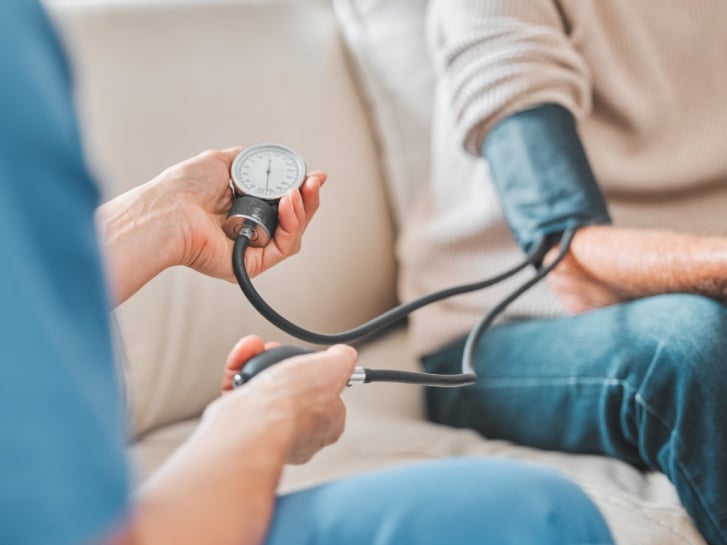
Adult congenital heart disease and pregnancy
Most people living with a congenital heart disease can have a family. Before doing so, it’s important to know the risks and plan with a healthcare professional.
Making a choice
Pregnancy causes changes in your body that can make your heart work harder. If you’re living with a congenital heart disease, your pregnancy will be considered more of a risk. That’s why you must speak to a healthcare professional about starting a family. They’ll want to know more about your general health to understand how you might handle a pregnancy, and will help you to make a care plan if needed.Preparing for pregnancy
If you decide to have a family, see your doctor as soon as possible, as you may have to wait a little while before you start trying for a baby. This is so doctors can find out if you need to take any steps for your health before you get pregnant. They’ll do this by asking about your lifestyle, including things like:
- how active you are and how much exercise you do
- what your diet is like
- are you a healthy weight?
- if you smoke
- if you drink more alcohol than the recommended limit (14 units per week)
- if you’re managing other conditions like diabetes or high blood pressure well
if you’ve not had a check-up recently, they’ll find out how your heart is by doing tests like:
- an echocardiogram
- an MRI
- an ECG
- blood tests.
Whether you’re able to start trying for a family right away or not depends on you and your condition.
Before you try to get pregnant, your healthcare professional may ask you to:
- have more tests
- have an operation or procedure if needed
- plan and adjust your medicine doses
- make lifestyle changes.
In some cases you may be offered optional genetic testing depending on your family history.
Risks
Because your heart works even harder during pregnancy, your risk can be higher depending on your health. These issues can include:
- arrhythmias
- blood clots
- heart failure
- fluid on the lungs.
Having a healthy lifestyle before you get pregnant can help to reduce any problems you may have during your pregnancy.
Getting pregnant when you have a mechanical valve
Blood clots are more common in people who have had a mechanical valve replacement. Clots can make you very unwell or cause a stroke or heart attack. To help prevent clots, most people with a mechanical valve will take an anticoagulant medicine called warfarin. Warfarin works well but is not recommended in high amounts during pregnancy as it can affect a growing foetus.
You’ll need to speak with your healthcare professional and have a plan for your medicines while you’re pregnant. This plan may include:
- using a low dose of warfarin
- using heparin, which needs to be injected twice a day
- switching between warfarin and heparin at different times during your pregnancy.
Mechanical valve risks during pregnancy
Pregnancy in women with mechanical heart valves comes is also high risk. This is because clots are more likely while you’re not on your normal, higher dose of warfarin.
This can feel worrying and scary at times, but it does not mean you’ll get a clot during your pregnancy. Following your doctor’s guidance and planning ahead will keep you as safe as possible. That’s why you’ll have regular check-ups and your medicine may change throughout your pregnancy.
If you have any questions or concerns about getting pregnant when you have a mechanical valve, talk with your healthcare professional.
What to do if your pregnancy is unplanned
Sometimes a pregnancy is unplanned. The most important thing is not to panic and speak to a healthcare professional immediately. Contact your congenital centre, clinic or GP and explain what has happened. They will help you and give you the best advice possible.
Inheriting a heart condition
If you have a congenital heart condition, there’s a higher chance that your child will be born with one. But does not mean your child will definitely get one.
It depends on different factors, like:
- the specific condition you have
- whether other family members have or had a condition
- whether your partner has a heart condition also.
If you have an inherited heart condition, your child may inherit it. The chances of this happening depend on your condition.
It’s possible to find out whether one of your genes could lead to an inherited heart condition (IHC) with genetic testing (sometimes called genomic testing). You do not have to do this test. If you do, you’ll usually need to be referred by a healthcare professional.
During pregnancy
The type of care you’ll have during your pregnancy all depends on you and your condition. If your condition is stable and you’re well, you’ll have normal antenatal care (care for pregnant people) and a visit to a special pregnancy and heart disease clinic once during your pregnancy.
If your condition is more complicated, risky or you’re unwell, you may go to a special pregnancy and heart disease clinic once a month. This is more likely for people with a mechanical valve.
If you or your partner has congenital heart disease, you might be offered a fetal echocardiogram (a test that creates detailed images of your baby’s heart) at around 20 weeks into the pregnancy. This test will check how your baby’s heart is working.
Medicine
Your medicine may have to change or stop before and during your pregnancy because some medicines can be risky to take during pregnancy. Stopping and changing medicines can be serious depending on the condition you have.
You and your healthcare professional will have a plan before you become pregnant to stop or change your medicine safely.
- Bumps have a useful online guide if you want to find out more about your medicine.
Exercise
If you’re used to exercising, it’s okay to keep doing it while you’re pregnant. You should not start any new or do strenuous exercise. Low impact activities like Pilates, maternity yoga and walking are okay.
Work
If you’re pregnant and have a congenital heart disease, stay in tune with how you’re feeling and tell your work as soon as possible. You may feel fine during your pregnancy and may be able to carry on with your current routine. If you feel strained or very tired (fatigued), talk to your employer about what you may need.
- Learn more about work and your heart condition.
Labour and delivery
In most cases, you should be able to follow your normal due date and wait for labour to happen naturally. You may be offered an induction if you get close to or go over your due date, because of higher risks the longer the pregnancy goes on. You should also be able to give birth at your local maternity hospital depending on how you are feeling.
If you have a more complicated condition or are unwell, you may have to go to a specialist cardiac hospital with a specialist team (obstetrics) . There, your specialist team will be able to take care of you and your heart during your labour and delivery.
Delivery
You should be able to have a natural birth (vaginal delivery). A caesarean is possible, although it can cause more complications because of things like blood loss and needing to manage medicines.
Whether you’ll have a natural birth or caesarean is a decision you’ll need to make with the obstetrics team (who look after you during your pregnancy) and cardiologist. You’ll see an anaesthetist before your delivery to talk about the medicines you’re able to use during labour to manage the pain.
Palpitations and arrhythmias can sometimes happen during labour. Your healthcare professional or team will be there to help manage any symptoms you have during your baby’s delivery.
After pregnancy
Recovery and follow-up
After the delivery, it’s likely you’ll need to stay in a high dependency unit (HDU) for a few days so you can be monitored to make sure you and your heart are doing well after delivery.
Depending on how the birth went you may be separated from your baby for a short time whilst your medical team are checking on or working on you. Your baby will be looked after by your family or midwives. You may wish to discuss what may happen when you’re seeing your team ahead of you having your baby.
The time it takes for you to go home depends on your condition and how you are.
If you’ve got a minor heart condition and you’re feeling well, then you’ll usually leave within a few days. You'll have a check-up a couple of months later, then go back to your normal check-ups.
If your condition is more serious, or you’re unwell, you may need to have tests before you leave to check on your heart. You’ll also have an appointment soon after you leave hospital to start taking your usual medication while you recover.
Breastfeeding and medicine
Some medicines cannot be taken while you’re breastfeeding because they can be passed on to babies through your breastmilk. If you’re going to breastfeed, talk with your healthcare professional about which medicines you can safely use.
Before you leave, your healthcare professional will have a chat with you about future family planning and contraception.
Health issues after birth
Due to the stress it puts on your heart and the changes your body goes through during pregnancy and labour, you may have some health issues after giving birth.
A common issue is peripartum cardiomyopathy, which is a condition where your heart becomes enlarged and weakened in late pregnancy or after childbirth. Sometimes this condition leads to heart failure.
If a problem does occur, it's usually in the first couple of days after birth as your body changes. Common symptoms include:
- breathlessness, especially when trying to lie flat
- a cough
- water retention
- abnormal heart rhythms.
These symptoms can sometimes be missed as you recover. It’s important you contact a healthcare professional if you have any of these symptoms or you’re worried about your health.
Family planning for men
Men living with congenital heart disease should be able to safely have a child.
Although you’re not the one getting pregnant, you still need to speak with a healthcare professional before you decide to start a family. They’ll want to find out how healthy and ready you are to support your partner during and after pregnancy.
They’ll run through similar checks as they would for a woman wanting to start a family. This may mean waiting while you make lifestyle changes, have treatment or do genetic testing.
- Learn more about preparing for pregnancy.
Heart helpline and other support
- speak to our cardiac nurses by phone, callback, email or online chat on Heart Helpline (Monday to Friday, 9am to 5pm)
- sign up to our Heart Matters magazine for online information packed with health and lifestyle advice
- meet other people with heart disease by joining a support group or online community
- Bumps provides freely available, reliable, evidenced-based and accurate information about the use of medicines in pregnancy
- Somerville heart foundation provides advice for those specifically born with a heart condition
- Tiny tickers provides peer support, advice on birth and offers support packs for families affected by congenital heart conditions.

You can trust our health information
We've followed an eight-step process to make sure this content is reliable, accurate and trustworthy.
Learn how we make our health content.


